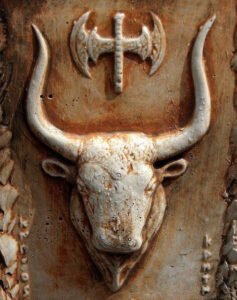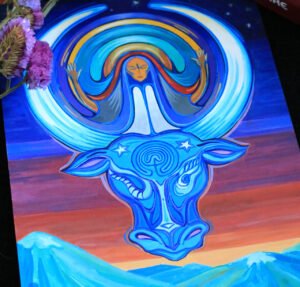
Horned gods used to symbolize warriors, fertility for both humans and animals, and were masters of animals. They had as attributes the horns of bulls or cows, signifying honor, dignity, and strength, or of rams and goats – as a sign of productive power and fertility.
Horns in Ancient Egyptian culture
For the Egyptians, cow horns symbolized the goddess Hathor as the Great Mother; they are also depicted as a crescent with Isis and Nut, the mistress of the heavens.


Horns in Ancient Greek and Roman cultures
Let’s not overlook ancient Greek and Roman cultures. Dionysus and Pan embody the wild and fertile side of nature, while Pluto’s “Horn of Amalthea”, symbolizes wealth and abundance, fitting for a god. Zeus once appeared before the beautiful Europa in the form of a white bull to abduct her.
In Ancient Rome, during taurobolium (bull sacrifice rites), initiates were soaked with bull’s blood, symbolizing the flow of life. Similar symbolism of blossoming and vitality was adopted in ancient Indo-Iranian myths.
Zodiac sign – Taurus
The Taurus zodiac sign, symbolized by the Bull, draws upon the cultural significance of horns, representing strength and protection. These traits mirror Taurus’s characteristics of determination and resilience, while also signifying abundance and spiritual connection, defining the essence of this steadfast sign.
Rituals and ceremonies
The most dangerous of all domestic animals, the bull has served as both an object of worship and competition since ancient times. Its strength has been a measure for many legendary heroes (such as Heracles) and Minoan acrobats who performed somersaults using the sharp horns of bulls as support.
Bulls were sacrificed in ritual sacred festivals in honor of the Sun god Mithras, believing that their blood symbolized the source of life and symbol of the Spring. Later the symbolism associated with the bull, representing death and rebirth, spread widely.


Carabao symbolism
One great example of a horned animal represented in culture is the water buffalo, also known as the “carabao“.
The Carabao buffalo indeed holds significant cultural symbolism in the Philippines, representing strength, resilience, and hard work, and it’s deeply intertwined with the nation’s identity and heritage.
In a country where nature plays a vital role in daily life, the Carabao Buffalo symbolizes a harmonious relationship between humans and the environment. Beyond its practical uses, the Carabao Buffalo is deeply woven into Philippine folklore. Folktales often portray the Carabao as a mystical creature, associated with fertility, nature, creative energy, and earth magic.
OUR NEWSLETTER
Subscribe to our newsletter and get 10% off your next purchase!